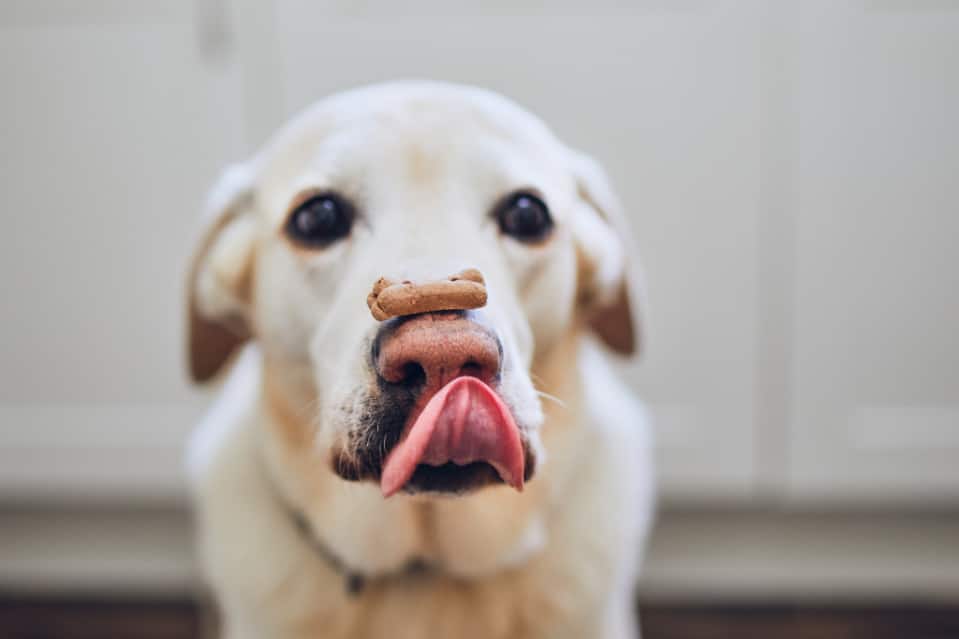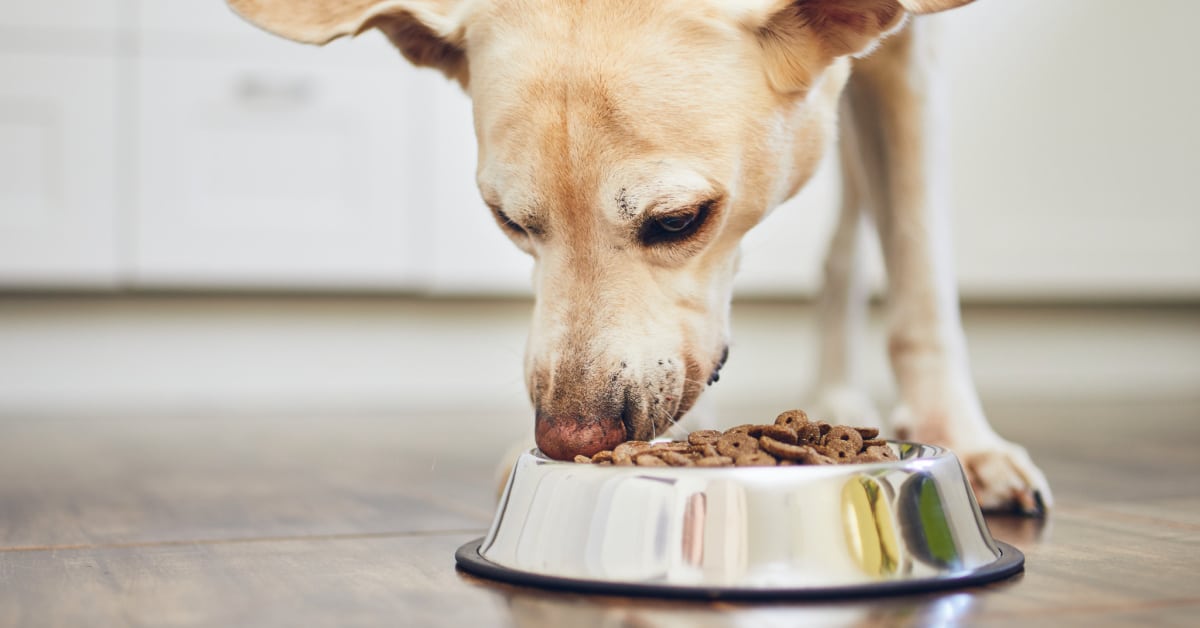If you’re like most owners of a Labrador Retriever, you may be shaking your head by now, wondering how to deal with a Lab that is always hungry.
After all, one of the most common descriptions you hear about a Labrador is that they eat a lot.
Sure, they’re incredibly energetic pets and will need a lot of exercise in a day, but with that level of energy also comes the fact that your Lab is always hungry.
Sometimes, it can even be slightly alarming when you see how much food your Labrador actually eats.
If you are a first-time Labrador Retriever owner, you may still not be used to their incessant begging for food or the amount of food that they eat.
Don’t worry too much, though. There are things that you can do to help you deal with a Lab that is always hungry.
The rest of this article will explain why your Labrador is always hungry, why they beg for food a lot, and the possible steps that you can take to deal with a Lab that is always hungry.
Hopefully, you will eventually get the hang of it and be able to figure out what to do.
Why is your Lab always hungry?
Food motivation is not always a bad thing. In fact, Labradors being food-motivated is probably one of the reasons why they are so trainable as pets, service dogs, or any other type of work dog.
With their even temperaments and their love for food, getting a Lab to do what you want by giving them treats can be a great opportunity.
However, Labradors did not get the reputation of being always hungry for no reason at all. In fact, a Lab’s hunger patterns have a lot of scientific evidence behind it.
According to this recent study of more than 300 Labradors, there is a certain gene mutation that contributes to how hungry a Lab is.
The gene mutation literally inhibits a Labrador from feeling hunger. The gene mutation showed up in a significant number of the Labradors involved in the study.
And while the gene is not the ultimate reason why Labs are hungry since not all Labs have the gene mutation, it certainly does play a part.
Nonetheless, it is interesting to see how the science backing up a Labrador’s propensity for food can contribute to what we initially thought as just coincidence.
However, another thing that a Labrador is prone to is obesity. Even though Labradors are generally energetic dogs, the amount of food that they eat could catch up to them.
This is especially true when Labradors get older and slowly become more sedentary compared to their youthful counterparts.
As a matter of fact, it is a common recommendation to regulate Labrador food intake, especially when they are starting to gain weight beyond what is recommended.
What to do about a Labrador that is always hungry?
When one says their Lab is always hungry, they usually mean that their Lab seems to never be satisfied with their daily meals and that they keep begging for food during their owner’s mealtimes.
The problem of obesity and hunger is a cycle. Both these issues feed off of each other and contribute to the problem in their own ways.
As such, many Lab owners are wary about the fact that their dog seems to always like to eat.
To help you curb your Lab’s habit for begging, here are some handy tips you can try out:
1) Ignore bad behavior.
Like many other training tactics, ignoring bad behavior will be effective in minimizing undesirable behavior in your Lab.
For a pet, your attention and care are a very important part of their lifestyle. Your lack of attention will teach them that what they are doing is not working.
When you tolerate their bad behavior, you will only end up encouraging them and not quelling.
Plus, ignoring their bad behavior is, by far, much better than punishing them for it.
A negative reaction to the things that they do is an outdated form of training that has long since been replaced by positive reinforcement as the ideal training method.
2) Reward them when they do good.
What you want them to do is not beg for more food in certain situations.
An example of this would be to get them to stop begging during your mealtimes.
The first thing that you have to do is to establish space between your dining area and where your Lab is.
Instill in them that they need to stay in this space while you are eating. That way, your Lab will not be tempted by the food that you are eating.
When you get through an entire mealtime without them begging for food, you can reward them as you like.
However, make sure to go to them and not have them come to you towards the dining area.
You inviting them over when your initial instructions were to do the opposite can be confusing to your Lab.
Essentially, training your Lab to stop begging for food is just a mixture of rewarding them and trying to ignore what you don’t want them to do.
Yes, it needs a ton of repetition, and you probably won’t get it right the first time.
But, with enough time and effort, you will succeed in getting your Lab to stop begging for more food when they’ve already had their share.
However, that’s not the only thing that you need to do. Your Labrador’s hunger and eating problems are not just composed of them begging during mealtimes.
It could also involve how much they are eating in treats or how much they are eating in general.
Regulating your Labrador’s diet

As their primary caretaker, it falls on your hands to curate a diet for your Labrador that is safe and healthy for them.
You cannot feed them too little since it could affect their overall wellness.
In the same way, you cannot feed them too much, as this could cause many problems in the future.
So, what do you do?
1) Talk to your vet.
A safe first course of action is to talk to your vet. They should be able to advise you on the amount of food that your Lab should be eating.
Additionally, they can make any necessary adjustments for any medical issues or health concerns that your Lab may have.
2) Check the label.
Most of the commercial food available on the market have labels that provide serving suggestions.
These suggestions usually vary depending on weight and energy level. Thus, the packaging is usually a good place to start.
Refer to the previous tip and ask your vet what kind of food they can recommend for your Labrador.
With the influx of options out there, it can be easy to get overwhelmed. Just do your research and try to put your Lab’s best interest in mind.
3) Adjust if you need to.
Of course, the packaging labels are not the ultimate guide. Dogs have their individual needs that may differ from the general population. The serving suggestion may not be enough for them or may be too much.
It is important to know the needs of your Lab so that you can provide accordingly.
It will take some time and observation, but you can adjust their diet if it seems that the amount of food you are giving them is not the right amount of food.
As a side note, wet canned food will usually make your Lab feel fuller. The amount of canned food you need to satisfy your Lab’s daily calorie requirements is more than the amount you would feed if they were eating dry food. This is due to higher water content found in canned food.
Thus, you may have more success in curbing your dog’s appetite with canned food.
Again, this is just a suggestion and is not meant to replace the professional advice that your vet gives you.
Try to be prudent in your food choices and adjust according to what your Lab needs.
4) Cut back on treats.
Another reason for Labrador weight gain is the treats that they consume.
When stacked up, those treats could easily make a dent in your Labrador’s recommended daily food consumption.
If you don’t cut back on treats, it could have bad results.
A common suggestion for helping pet owners deal with a Lab that is always hungry is to deduct the amount you feed them in treats from their main meals.
That way, they can still get treats but without the risk of overeating.
Another thing that you can do is to give them treats that are healthy and good for them.
Crunchy and firm fruits like apples make an excellent alternative for your Labrador that’s always hungry.
Conclusion
Yes, it can be tough not knowing how to deal with a Lab that is always hungry. This is especially an issue if you fear that they will gain so much weight that they become obese.
Those thoughts are incredibly valid and are by no means uncommon.
However, if you take diligent care in monitoring your Labrador’s food intake and dealing with why your Lab always seems to be hungry, you’ll be good to go.
Caring for a pet can be a challenge. But, the love and affection that your Labrador will give you in return is worth more than what money can buy.







